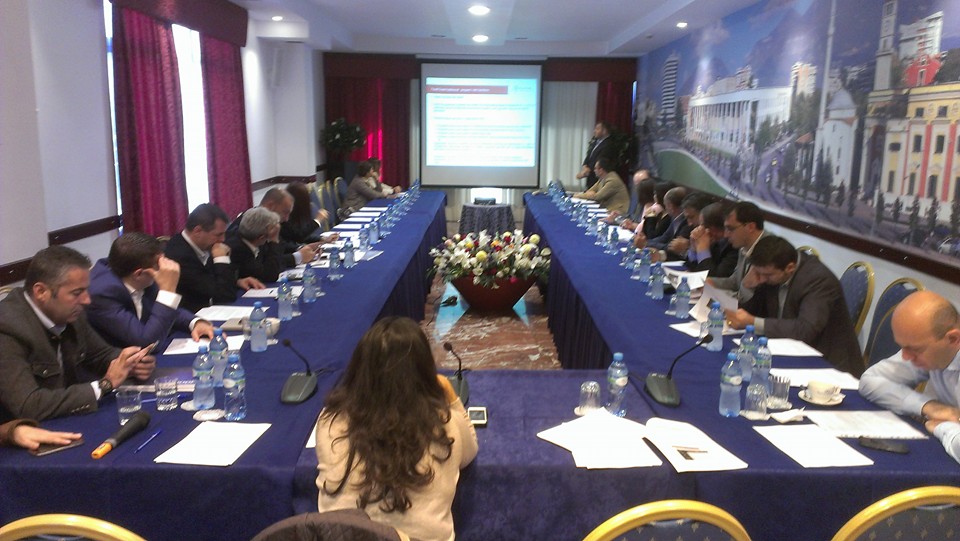 With the support of the Swiss Cooperation in Albania, dldp has allocated a 700,000 Euro fund for the identification, development, implementation and monitoring of projects selected from municipalities of Kukës, Dibër and Durrës Qarks. On October 23rd, 2015, a consultative meeting was held in Tirana with the participation of 7 municipalities of these 3 Qarks that would benefit from the instrument of dldp Grant Fund, where they presented the current status of activities for project-proposals’ writing, findings, challenges and approaches proposed.
With the support of the Swiss Cooperation in Albania, dldp has allocated a 700,000 Euro fund for the identification, development, implementation and monitoring of projects selected from municipalities of Kukës, Dibër and Durrës Qarks. On October 23rd, 2015, a consultative meeting was held in Tirana with the participation of 7 municipalities of these 3 Qarks that would benefit from the instrument of dldp Grant Fund, where they presented the current status of activities for project-proposals’ writing, findings, challenges and approaches proposed.
In the meeting there were the technical staff representatives of these beneficiary municipalities: Durrës, Shijak, Tropojë, Dibër, Mat and Klos, members of dldp partner organizations supporting municipalities in project-proposal writing, Swiss Embassy representatives, as well as experts from Environmental Ministry and Urban Development Ministry.
The proposed project-proposals during the technical workshop from each municipality are identified during a process separated into several phases. First their identification was carried out in the framework of the Functional Zones Program (FZP), where 5 of the best project were rated by the public, experts and local elected officials. Then their re-validation was done by new mayors. After this, pre-feasibility evaluations were carried out and there were set up scenarios based in project-ideas, which are being developed further into full proposals with the support of the dldp.
During the first session of this meeting, dldp experts presented the steps and the schedule according to which all these project-proposals will have to abide by until the moment of the signing of the implementation agreement. The second session of the meeting was divided into two parallel parts according to lines: in the session of projects in the infrastructure field and in the session of project in the waste management field and One Stop Shops.
LGUs’ experts, supported by relevant service providers, presented the selected approach, technical and financial scenarios combined with elements of social inclusion, risks identification associated with the project during implementation and eventual solutions, as well as the need for technical assistance to continue the implementation. After each presentation, participants discussed the polishing of project details. Valuable suggestions were given by ministerial experts, which served to the technical improvement of project-proposals so that projects will be implemented on a faster pace.
The implementation of these projects will be carried out in 2016.
Consultative meeting on dldp Grant Fund LGUs’ project-proposals
In the meeting there were the technical staff representatives of these beneficiary municipalities: Durrës, Shijak, Tropojë, Dibër, Mat and Klos, members of dldp partner organizations supporting municipalities in project-proposal writing, Swiss Embassy representatives, as well as experts from Environmental Ministry and Urban Development Ministry.
The proposed project-proposals during the technical workshop from each municipality are identified during a process separated into several phases. First their identification was carried out in the framework of the Functional Zones Program (FZP), where 5 of the best project were rated by the public, experts and local elected officials. Then their re-validation was done by new mayors. After this, pre-feasibility evaluations were carried out and there were set up scenarios based in project-ideas, which are being developed further into full proposals with the support of the dldp.
During the first session of this meeting, dldp experts presented the steps and the schedule according to which all these project-proposals will have to abide by until the moment of the signing of the implementation agreement. The second session of the meeting was divided into two parallel parts according to lines: in the session of projects in the infrastructure field and in the session of project in the waste management field and One Stop Shops.
LGUs’ experts, supported by relevant service providers, presented the selected approach, technical and financial scenarios combined with elements of social inclusion, risks identification associated with the project during implementation and eventual solutions, as well as the need for technical assistance to continue the implementation. After each presentation, participants discussed the polishing of project details. Valuable suggestions were given by ministerial experts, which served to the technical improvement of project-proposals so that projects will be implemented on a faster pace.
The implementation of these projects will be carried out in 2016.
Related posts
New functions and monitoring of performance indicators for LGUs
Read more
Funksionet e reja dhe monitorimi i treguesve të performancës tek NJQV
Read more
National Competition of Best Local Practices 2016
Read more